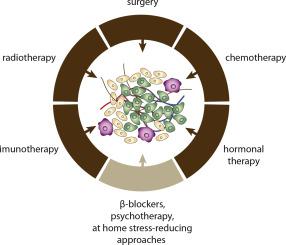当前位置:
X-MOL 学术
›
J. Neuroimmunol.
›
论文详情
Our official English website, www.x-mol.net, welcomes your feedback! (Note: you will need to create a separate account there.)
Stress and cancer. Part II: Therapeutic implications for oncology
Journal of Neuroimmunology ( IF 3.3 ) Pub Date : 2020-09-01 , DOI: 10.1016/j.jneuroim.2020.577312 Boris Mravec 1 , Miroslav Tibensky 2 , Lubica Horvathova 3
Journal of Neuroimmunology ( IF 3.3 ) Pub Date : 2020-09-01 , DOI: 10.1016/j.jneuroim.2020.577312 Boris Mravec 1 , Miroslav Tibensky 2 , Lubica Horvathova 3
Affiliation

|
Accumulated evidence has confirmed the ability of stress to promote the induction and progression of cancer (for review see Stress and cancer. Part I: Mechanisms mediating the effect of stressors on cancer). In support of this, data from clinical trials utilizing approaches that reduce stress-related signaling have shown prolonged survival of cancer patients. Therefore, the question has arisen as to how we can utilize this knowledge in the daily treatment of cancer patients. The main aim of this review is to critically analyze data from studies utilizing psychotherapy or treatment by β-blockers on the survival of cancer patients. Because these approaches, especially treatment by β-blockers, have been routinely used in clinical practice for decades in the treatment of non-cancer patients, their wider introduction into oncology might be realized in the near future.
中文翻译:

压力和癌症。第二部分:对肿瘤学的治疗意义
积累的证据已经证实压力能够促进癌症的诱发和进展(综述参见压力和癌症。第一部分:调节压力源对癌症影响的机制)。为了支持这一点,来自使用减少压力相关信号的方法的临床试验数据显示癌症患者的生存期延长。因此,出现了一个问题,即我们如何在癌症患者的日常治疗中利用这些知识。本综述的主要目的是批判性地分析利用心理疗法或 β 受体阻滞剂治疗对癌症患者存活率的研究数据。因为这些方法,尤其是β受体阻滞剂的治疗,几十年来一直在临床实践中常规用于非癌症患者的治疗,
更新日期:2020-09-01
中文翻译:

压力和癌症。第二部分:对肿瘤学的治疗意义
积累的证据已经证实压力能够促进癌症的诱发和进展(综述参见压力和癌症。第一部分:调节压力源对癌症影响的机制)。为了支持这一点,来自使用减少压力相关信号的方法的临床试验数据显示癌症患者的生存期延长。因此,出现了一个问题,即我们如何在癌症患者的日常治疗中利用这些知识。本综述的主要目的是批判性地分析利用心理疗法或 β 受体阻滞剂治疗对癌症患者存活率的研究数据。因为这些方法,尤其是β受体阻滞剂的治疗,几十年来一直在临床实践中常规用于非癌症患者的治疗,


























 京公网安备 11010802027423号
京公网安备 11010802027423号